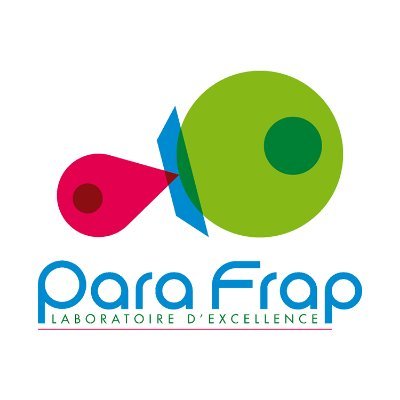LabEx ParaFrap

Who are we?
Parasitic infections remain a major cause of morbidity and mortality worldwide; they plague billions of people and kill millions annually, and inflict debilitating injuries such as disfiguration on additional millions. Malaria alone is estimated to cause up to 500 million clinical cases and over one million deaths each year. The vast majority of infections in humans and domestic animals can be attributed to protozoan pathogens responsible for malaria, African sleeping sickness, leishmaniasis, toxoplasmosis, bovine tropical theileriosis and amoebiasis. France has a longstanding tradition in academic parasitology research with several outstanding discoveries in the past. Although today, many groups have a very strong international visibility (2 ERC awards, 2 CNRS silver medals, organizers of prestigious international parasitology conferences) a number of weak points are apparent. Many laboratories work isolated (students and post docs do not know the community) and no common policy exists between laboratories dispersed over many sites in France. This causes an insufficient national/international visibility and low attractiveness for excellent students/researchers. In addition, sharing of competence and technical platforms is mostly lacking leading to a fragmented national parasitology community and duplication of efforts.
Leading groups of the French parasitology community have decided to integrate their scientific expertise and activities to combat major protozoan parasites as a consortium named ‘French Parasitology Alliance for Health Care’. This is the first time in France that a comprehensive alliance is proposed. The objectives of the French Alliance for Parasitology and Health Care (acronym ParaFrap) will address precisely the actual weakness to initiate a profound restructuration of the French parasitology community to build on their potential strength.
Why a national LabEx of parasitology? France has a long tradition in parasitology research with outstanding discoveries. Laveran received in 1907 the Nobel Prize for his discovery of the protozoan parasite that causes malaria and Charles Nicolle first described Toxoplasma in 1908. Today, the French parasitology community is also pleased that two ParaFrap participants, Stéphanie Blandin (Young European Research Council program) and Elena Levashina are close collaborators of the 2011 Nobel Prize Jules Hoffmann (CNRS-University of Strasbourg, France), who has initiated the work on innate immunity on the malaria mosquito in 2001 in his unit. In addition, a large number of French research institutions host internationally recognized parasitology teams. At the same time, a number of innovative ‘small industry’ (SME) and ‘big pharma’ have demonstrated their interest and implication in combating major human and veterinary parasitic pathogens. However, traditionally, a large gap exists between academic research and industry that need to be overcome to foster national synergies in combating major disease caused by a variety of protozoan parasites. On the other hand, the absence of coordinated parasitology research between institutions leads to duplication of efforts and resources and not adequately national and international visibility of the parasitology community.